People
CURRENT LAB MEMBERS
| Joe Thornton Professor, Human Genetics and Ecology & Evolution joet1 (at) uchicago.edu 773-834-3423 |
 |
Joe is interested in protein and molecular evolution, phylogenetics, the history and sociology of science, mentoring early career scientists and students, making science and academia more humane, more inclusive, and less elitist, reading good books (right now, George Saunders, Colson Whitehead, Walt Whitman, James Baldwin, and Richard Rorty), touring long distances and high mountain passes on his bike or on foot, and loving his children, who are now adults. Before coming to Chicago he was on the faculty at the University of Oregon. He did his Ph.D. and postdoctoral work at the interface of phylogenetics and molecular biology at the American Museum of Natural History and Columbia University. Before that he was the research coordinator for Greenpeace’s U.S. and international toxics campaigns; where he worked with affected communities to advocate for systemic changes in environmental policy. Joe was an undergraduate English major and didn’t take a biology course until he was 30, which ended up (mostly) helping him in his work as a scientist. You can read a profile that Nature did on him and the lab here. |
| Brian Metzger NRSA Postdoctoral fellow |
 |
Brian, an NRSA-funded postdoc and devoted parent to his kids, is interested in whether the historical mechanisms by which new functions evolved represent the most functionally effective or mutationally accessible trajectories or, alternatively, whether there were many alternative routes that evolution could have taken. To address this question, Brian is applying techniques from protein engineering — experimental evolution and deep mutational scanning — to trace pathways from reconstructed ancient proteins to towards their modern functions. Brian did his graduate work with Trisha Wittkopp at the University of Michigan and received his undergraduate degree from the University of Wisconsin. His website, which is here, cannot describe how terrifying an opponent he is at board games. |
| Arvind Pillai Graduate student, Ecology and Evolution |
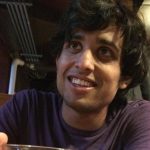 |
Arvind studies the evolution of molecular complexity using ancestral protein reconstruction and biochemical experiments. His work focuses on the evolution of hemoglobins — a heterotetramer in a larger family of monomers homodimers — as a tractable model for the evolution of a complex molecular machine with multiple intersubunit interfaces. Arvind was a neurobiology major at the University of Texas, where he studied the evolution of gene families involved in neural transmission. In his spare time, Arvind is the reincarnation of Jorge Luis Borges. |
| Yeonwoo Park Graduate student, GGSB Samsung Fellow |
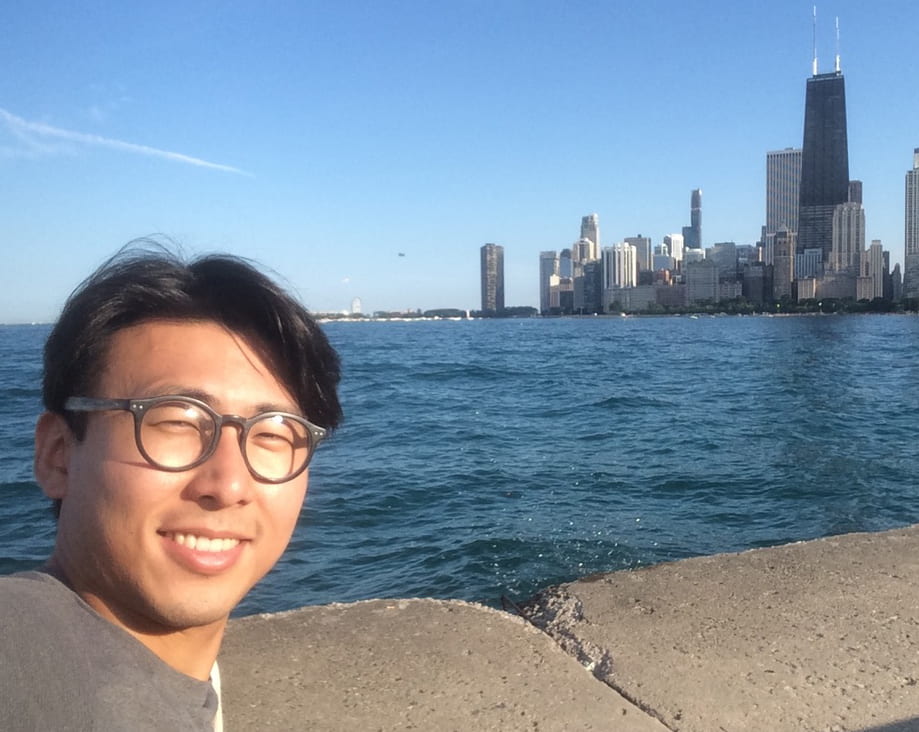 |
Yeonwoo studies how chance historical events constrained the possible paths of protein evolution. He is applying deep mutational scanning on reconstructed ancestral proteins, tracing how the accessibility of every single-step evolutionary trajectory changed during long-term evolution due to epistatic interactions among mutations. Yeonwoo was born and raised in South Korea, and came to the U.S. in 2011 to begin an undergraduate study at Yale University. In his spare time, Yeonwoo is either taking care of his two cats, or enjoying the Chicago wind along the lakeshore trail on his bicycle. |
| Jaeda Patton Graduate student, GGSB NSF Graduate Research Fellow |
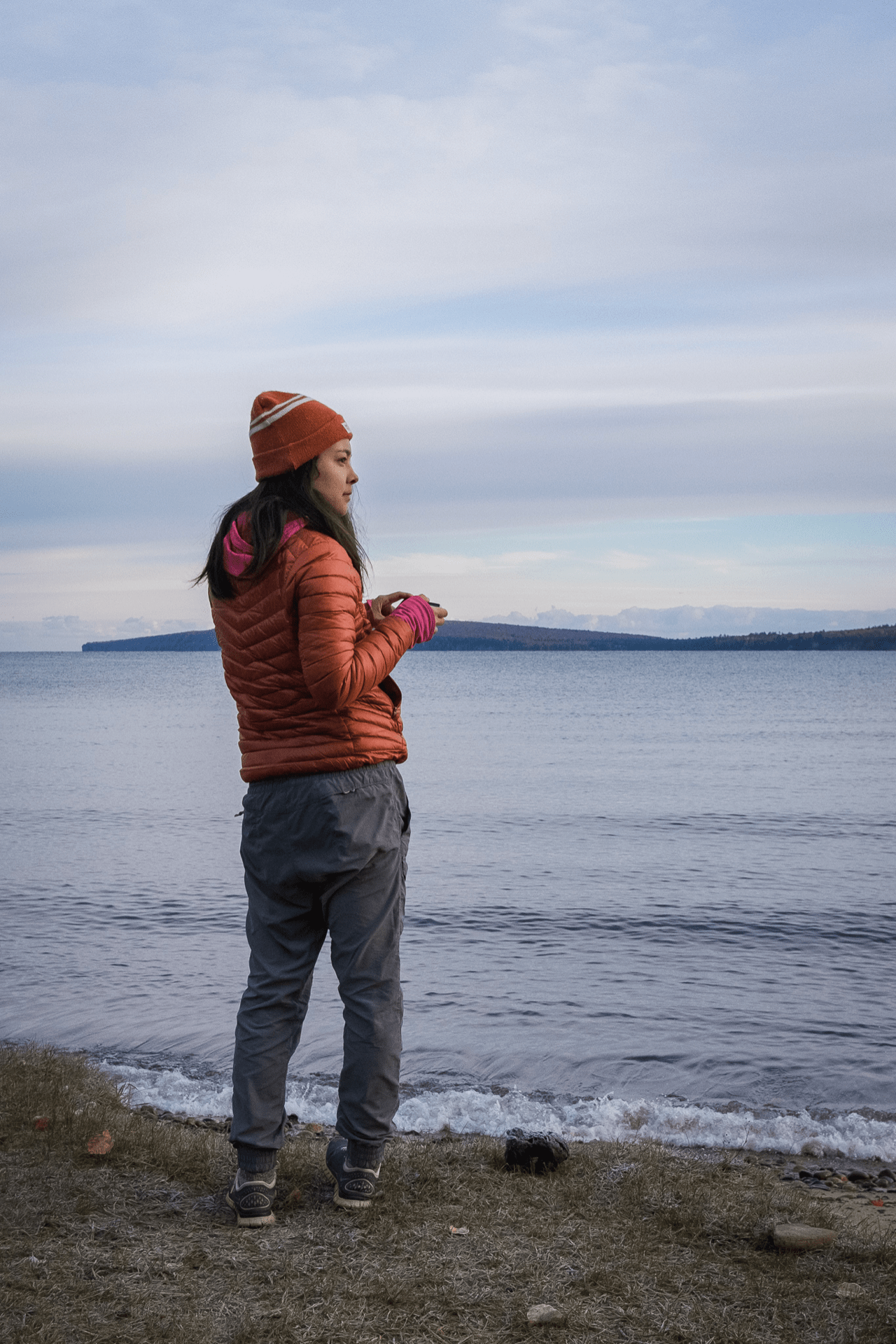 |
B Jaeda is using deep mutational scanning and ancestral protein reconstruction to understand the genetic and biophysical mechanisms underlying the accessibility of novel protein phenotypes during evolutionary history. Jaeda grew up in Portland, OR, and obtained her bachelor’s degree in Biology from Cornell University. Before graduate school, she worked as a lab technician at the University of Washington studying C. elegans genomics. She enjoys exploring the urban and rural landscapes and foodscapes of the Upper Midwest, as well as singing in the University Chorus at UChicago |
| Carlos Cortez Graduate student, Cellular and Molecular Biology |
 |
Carlos is using biochemical techniques to characterize the evolutionary origin of heterotetrameric specificity, allostery, and cooperativity. I was born and grown in Los Angeles, California and went to college at CSULA where I was a microbiology major and researched RNA biochemistry. In my own time, I work with various organizations on campus to make higher learning more inclusive. For fun, I like discovering new music and riding my bike on the Lakefront trail. |
| Santiago Herrera-Álvarez Graduate student, Ecology and Evolution |
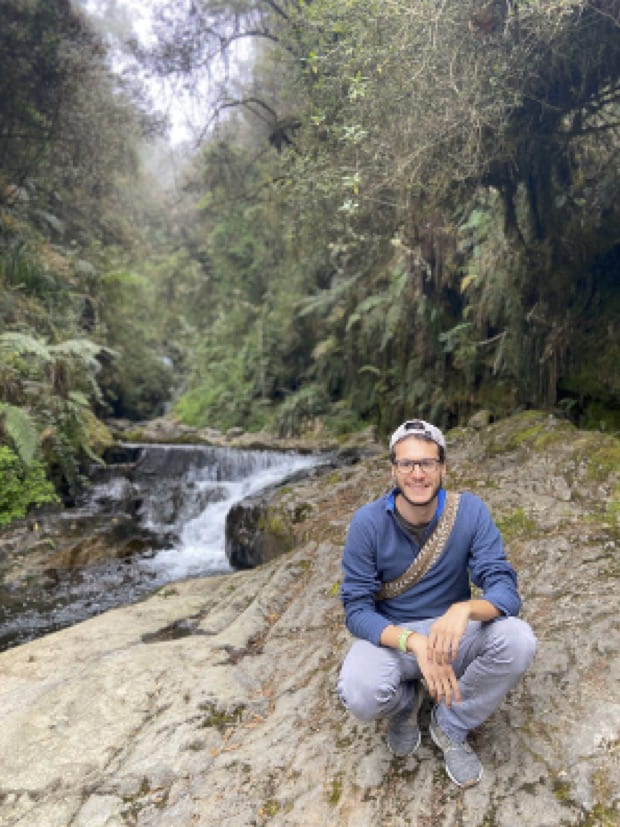 |
Santi is studying the mechanisms of gene regulatory evolution and how these affect evolutionary processes, with reference to organismal development and long-term evolutionary processes. His work focuses on a massive characterization of the sequence space of an ancestral regulatory module to understand how accessible were different functions under mutation, drift, and selection. He earned a double major in Biology and Microbiology, and a master’s degree from Universidad de los Andes, Bogotá, Colombia, where he worked on the genetics of adaptation to toxin resistance in toad-feeding species and the evolution of gigantism in the capybara. In his spare time, Santi enjoys playing the guitar, walking by the Lake Michigan, and is a landscape photography aficionado. |
| Ricardo Muñiz Trejo Graduate student, Ecology and Evolution |
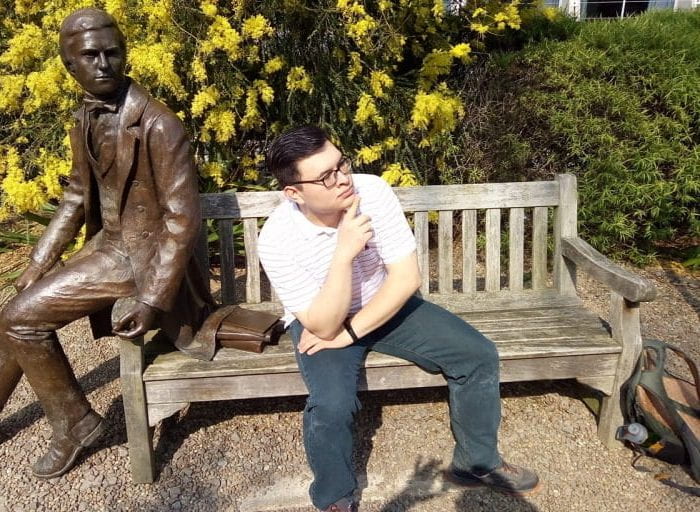 |
Ricardo Muniz Trejo is a graduate student in Ecology and Evolution. Ricardo is Mexican queer biochemist whose work has been focused on the evolution of thermostability through oligomerization. He majored in Biology at the National Autonomous University of Mexico (his “second home”, in his own words), and later got a master’s in Biochemistry at the same University. Ricardo always enjoys a good Age of Empires II match, is starting to get into the D&D world, and considers himself a videogame nerd. |
| Arielle Weinstein Undergraduate researcher |
 |
Arielle is doing her honors thesis on the evolution of molecular complexes. Her work uses ancestral sequence reconstruction and biochemical characterizations to track the emergence of a higher-order protein assembly and allosteric regulation in bacterial citrate synthase enzymes. Originally from Washington D.C., she now enjoys running on the Lakefront Trail and exploring Chicago’s food scene. |
LAB ALUMNI
| Tyler Starr, Ph.D BMB Graduate Student, NSF Graduate Research fellowNow: Damon Runyon Postdoctoral Fellow, University of Washington |
 |
Tyler, studied how the topology of protein sequence-function space shaped the evolution of ancient proteins. Originally from Minnesoooota, Tyler was an undergraduate at Willamette University, a summer undergraduate researcher in the Thornton lab at UO, came to UChicago for grad school, and returned to the Pacific Northwest for his postdoc, where he is doing groundbreaking research on coronavirus evolution in the Bloom Lab. |
| Aarti Venkat, Ph.D. Human Genetics graduate studentNow: Senior Bioinformatics Scientist, Tempus |
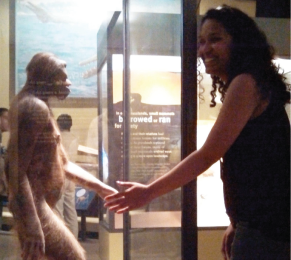 |
Aarti studied the molecular mechanisms for the evolution of specificity and cooperativity in DNA-binding transcription factors, and the accuracy of phylogenetic methods for inferring episodic positive selection. She did her undergraduate work in biochemistry at St. Xavier’s College in Mumbai, and then completed a master’s degree in bioinformatics at the University of Illinois, where she worked with Gene Robinson. Aarti then worked with Molly Przeworski at the University of Chicago before beginning the PhD program in human genetics and joining the Thornton lab. She is now a senior computational scientist at Tempus in Chicago. |
| Mo Siddiq, Ph.D. Ecology and Evolution Graduate Student, NSF Graduate Research FellowNow: NRSA Postdoctoral fellow, University of Michigan |
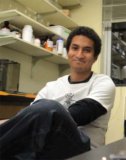 |
Mo studied the molecular mechanisms of functional evolution in alcohol dehydrogenase of those Drosophila. Mo did his undergraduate degree at the University of Indiana, where he worked with Kristi Montooth on evolutionary genetics in Drosophila. Mo was also a devastatingly effective pitcher for our slow-pitch softball team, the Cremasters. He is now a postdoctoral scientist using experimental and phylogenetic methods to characterize the evolution of transcriptional regulation in Trisha Wittkopp’s lab at U. Michigan. |
| Georg Hochberg, Ph.D. Postdoctoral scientist, UChicago FellowNow: Group Leader, Max Planck Institute for Microbial Ecology |
 |
Georg is a biophysicist by training who is interested in the evolution of protein complexes and protein-protein interactions. He studies how the oligomeric architecture of proteins changes over evolutionary time and how oligomeric proteins evolve a high degree of specificity in their assemblies. Socially Georg claims to be quiet and withdrawn, offering as evidence the photo of him at left from Mo’s wedding. |
| Jamie Bridgham, Ph.D Research scientist and lab managerAssistant Research Professor, University of Oregon Now: Happily retired! |
 |
Jamie was the anchor of the Eugene lab. A former NIH/NRSA fellow, Jamie has worked extensively on the evolution of steroid receptor specificity for ligands and DNA binding sites, but she has had a hand in most of the lab’s molecular projects. Jamie completed her Ph.D. at Notre Dame, working with Alan Johnson on the function and evolution of death receptors involved in apoptosis. |
| Geeta Eick, Ph.D Postdoctoral research scientistNow: Research scientist and laboratory manager, University of Oregon |
 |
Geeta resurrected ancestral steroid receptors to understand the evolution of androgen, progestagen, and corticosteroid sensitivity in early receptor lineages. She is also the master of the lab’s steroid receptor sequence database and leads much of our work in phylogenetic analysis. She studied biochemistry, phylogenetics, and evolution at the University of Stellenbosch and the University of Cape Town and then was trained in molecular biology at the Yale School of Medicine before coming to the UO in early 2007. Geeta once hiked 57 miles with 17,000 feet of elevation gain in a single day, while carrying a 95-pound pack. |
| Mike Harms, Ph.D NRSA Postdoctoral fellowNow: Associate Professor, Univ. of Oregon harms (at) uoregon.edu Mike’s website |
 |
Mike is a biophysicist and Associate Professor in the Chemistry Department and Institute of Molecular Biology at the University of Oregon. He did his graduate work at Johns Hopkins with Bertrand Garcia-Moreno. Mike’s postdoctoral work in the Thornton lab addressed how the biophysical properties of proteins affect evolutionary processes and to reveal why proteins have the properties they do. Mike is currently studying the evolutionary biophysics of epistasis, ligand specificity, and allostery. |
| Lora Picton, Ph.D Research scientist and lab managerNow: Research scientist at Stanford University |
 |
Early in her scientific career, Lora developed a desire to connect biochemical characterization with biological consequences. After undergraduate training in biochemistry, Lora did her doctoral thesis at Johns Hopkins with Blake Hill, studying the biochemistry and structure of mitochondrial fission proteins. Along with managing the Thornton Lab and helping to mentor and support students, she studied how DNA specificity of steroid hormone receptors evolved. When not at the bench, Lora is a devoted parent, voracious reader, an aspiring chef, and a lover of hiking and biking outdoors. |
| Carrie Olson-Manning, Ph.D NRSA Postdoctoral research scientistNow: Assistant Professor, Augustana University |
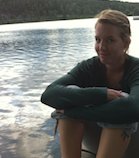 |
Carrie is interested in the evolution of enzyme activity and metabolic pathways. She studied how the corticosteroid synthesis pathway evolved in vertebrates. She completed her PhD at Duke University working with Tom Mitchell-Olds, where she studied the biochemical evolution of herbivore resistance in the charismatic relatives of broccoli. Carrie up in North Dakota, did her undergraduate research with Tony Dean in Minnesota, and found Chicago winters too mild for her liking. She is now a faculty member with a thriving lab at Augustana. |
| Qinwen Liu, Ph.D Postdoctoral research scientistNow: Senior Staff Scientist, Grail Inc. |
 |
Qinwen is interested in the evolution of DNA specificity and other functions in developmentally important transcription factors in Drosophila. She did her PhD in the evolutionary developmental biology in Caenorrhabditis species with Eric Haag at the University of Maryland. She is now a senior computational scientist working on cancer genomics at GRAIL in the Bay area. |
| Paul Cziko, Ph.D. Graduate student, NSF Graduate research fellow, UO BiologyNow: Research Scientist, University of OregonPaul’s website |
 |
Paul is a multidisciplinary polar biologist. In the lab, he studied nuclear receptor evolution and functional diversity in invertebrates. Paul was an undergraduate and then a research assistant at the University of Illinois, where he studied antifreeze proteins in Antarctic notothenoid fishes. He was an NSF Graduate Research Fellow and continued to make research voyages to Antarctica during his dissertation work. He is now an NSF-funded antarctic research scientist. In his spare time, he enjoys scuba diving in ocean water under a 20-foot thick layer of surface ice. |
| Dave Anderson, Ph.D. Graduate student, UO BiologyNSERC postdoctoral scientist, University of British Columbia Now: Director of Bioinformatics, University of Alberta School of Medicine |
 |
Dave studied the evolution of DNA specificity in steroid receptors. He received his undergraduate degree in theoretical astronomy from the Arts and Science Program at McMaster University. Trading star-dust for nucleotides, Dave cannonballed into the world of evolutionary biology with a master’s degree in evolutionary genetics with Ben Evans, also at McMaster. While at the UO, Dave was supported by a predoctoral Fellowship from the American Heart Association and a Doctoral Scholarship from Canada’s National Sciences and Engineering Research Council. He was an NSERC postdoctoral fellow with Nobu Tokuriki in the Chemistry Department at UBC and is now a tenure-track instructor and directors of bioinformatics at Univ of Alberta. . |
| Alesia McKeown, Ph.D. NSF Graduate research fellow, UO BiochemistryDamon Runyon postdoctoral fellow, University of Utah Now: Staff scientist, BioFire Diagnostics, Salt Lake City |
 |
Alesia studied the mechanisms for the evolution of specificity in steroid receptor DNA-binding domains. She helped pioneer the biochemistry side of the Thornton lab, revealing the mechanisms for the evolution of novel DNA-binding in the steroid receptors. Alesia was educated in the wholesome embrace of her native North Carolina, where she worked with Paulo Almeida on the mechanisms of cytolytic peptides. Alesia was a Damon Runyon a postdoc in Nels Elde’s lab at the University of Utah and is now a staff scientist at Biofire Diagnostics. She is an avid backpacker, rock climber, and canyoneer. |
| Bryan Kolaczkowski, Ph.D Graduate student, UO Computer SciencePostdoc, UC Berkeley Now: Associate Professor, University of Florida, Department of Microbiology |
 |
Bryan is a computer scientist and phylogeneticist. He was a graduate student in the lab and stayed on as a postdoc to complete several projects. Bryan studied the effect of evolutionary heterogeneity on current phylogenetic methods and developing new mixed-model techniques that are more accurate when the evolutionary process varies among lineages and sites. He has also done some beautiful work on the behavior of Bayesian phylogenetic methods. A former member of UO’s IGERT training program in Evolution, Development, and Genomics, Bryan is now an Assistant Professor at the University of Florida. |
| Jennifer Fox, Ph.D. NRSA postdoctoral fellowNow: Executive Director, |
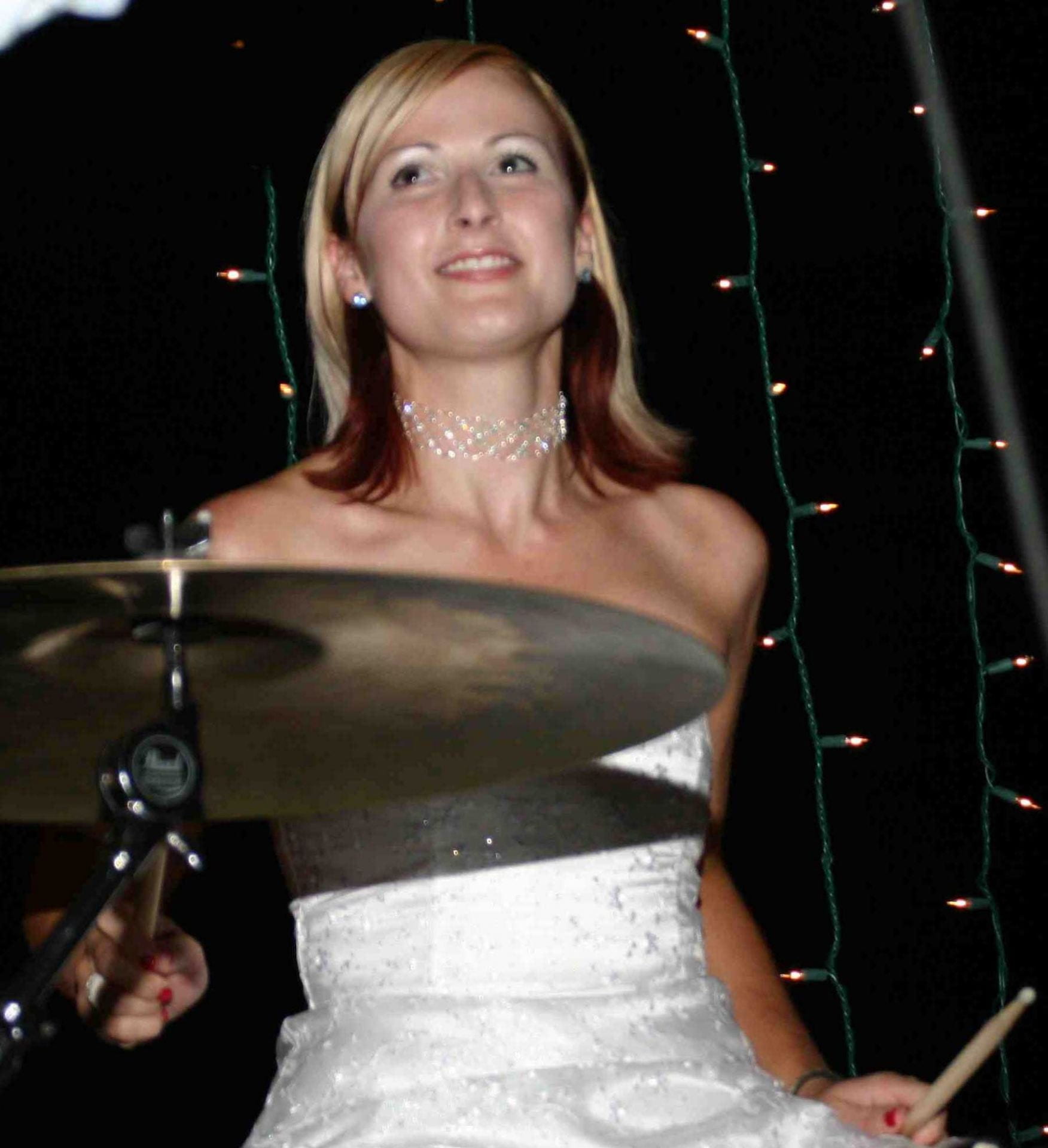 |
Jennifer was an NIH/NRSA fellow in the lab from 2004 to 2007. She was chief cell biologist and is now executive director at the Oregon Translational Research and Development Institute. When she was in the lab, Jennifer established an experimental evolution system in yeast to study how receptors evolve affinity for new ligands. Before joining us, Jennifer did her Ph.D. with John McLachlan at Tulane, where she discovered that endocrine disrupters in the environment can interfere with the symbiosis of plants and nitrogen-fixing rhizobacteria and was a postdoc with Craig Jordan at Northwestern, where she worked on ligand- and tissue-specific coactivators for the estrogen receptor. |
| Victor Hanson-Smith, Ph.D. Graduate student, UO Computer Science Postdoc, Sandy Johnson Lab, UCSFNow: Director of Computational Biology, Verge Genomics |
 |
Victor was a graduate student in the Computer and Information Sciences Department at the University of Oregon and an NSF IGERT fellow. Victor studied the performance and accuracy of algorithms for phylogenetic inference and ancestral sequence reconstruction and played a lead role in our collaborative project reconstructing ancestral VTPases with Greg Finnigan and Tom Stevens. In addition to being an impressive computational biologist, Victor also happens to be a conservatory-trained classical pianist and world-class hiker. |
| Sean Carroll, Ph.D. Graduate student, UO BiologyPostdoc, Chris Marx lab, Harvard Now: Staff scientist, Axcella Corp. |
 |
Sean was a graduate student in the Biology Department and an NSF IGERT fellow. Sean studied early glucocorticoid receptor evolution. He graduated in August 2009 and is now a postdoc with Chris Marx at Harvard, where he is using experimental evolutionary approaches in bacteria to study molecular adaptation. Sean is a very good frisbee player who occasionally has life-threatening bike accidents.
|
| June Keay, Ph.D., D. Pharm Grad student, UO Biology D. Pharm, Oregon State University |
 |
June was a graduate student at UO and an NSF graduate research fellow. June studied the functional diversity of estrogen receptors in invertebrates and was the lead researcher for the lab’s publications on ERs in mollusks and annelids, as well as ERRs in nemerteans. June then completed her training at OSU’s School of Pharmacy and is now a practicing D. Pharm. |
| Justine Brown, Ph.D. Undergrad researcher PhD, University of WashingtonNow: Program manager, Colorado Foundation for Public Health and the Environment |
 |
Justine was an undergraduate research assistant in the lab from 2006-2008. Justine studied the evolution of steroid hormone receptors in cephalochordates following a crucial gene duplication. While in the lab, Justine won the UO Undergraduate Research Fellowship, and her Biology honors thesis work was published in PLOS Genetics. Justine’s goal is to apply evolutionary, molecular, and epidemiological approaches to address the AIDS pandemic in sub-Saharan Africa. She completed her doctorate in the Pathobiology Program at the University of Washington. |
| Jackson Wong, MD Undergrad researcher MD, Oregon Health Sciences University |
 |
Jackson was an undergraduate in the lab from 2010-2012. He cloned and functionally characterized several ancestral estrogen-related receptors to define the genetic basis for the evolution of a new function in this family. Jackson is currently a research technician in Kirsten Lampi’s lab at Oregon Health & Science University, and will be applying for medical school in the fall. He likes to longboard, garden, and make his own kombucha (which, he assures us, is entirely legal). |
| Luke Webb, MD Undergrad researcher MD, Oregon Health Sciences University |
 |
Luke was an undergraduate researcher in the lab from 2009-2010. He worked on the development of a yeast system for directed evolution of ancestral steroid receptors and the expression and purification of resurrected glucocorticoid receptors. Luke is now a medical student at OHSU and remains, we believe, an awesome surfer and guitar player.
|
| John St. John, Ph.D. Undergrad researcher PhD, UC Santa Cruz Bioengineering Department Founder and chief scientist, Driver Group |
 |
John St. John was an undergraduate research assistant in the lab from 2007-2009. John used his programming abilities to study the accuracy of methods for selecting models for phylogenetic analysis. John completed an honors thesis in computer science and is now a doctoral student the Bioengineering Program at UC Santa Cruz.
|
|
Jesse Zaneveld, Ph.D
Undergrad researcher Ph.D, University of Colorado,
Postdoc, Oregon State University
Assistant Professor, University of Washington, Bothell
|
 |
Jesse’s Biology Honors thesis was a phylogenetic and structural analysis of the evolution of ligand-binding in the entire nuclear receptor superfamily. Jesse found that, contrary to current wisdom, the ancestral receptor was almost certainly liganded, and so-called “orphan receptors,” which are not regulated by hormones and other ligands, are evolutionary novelties. Jesse completed his Ph.D in the MCB program at U. Colorado and is now a postdoc in microbiology at Oregon State.
|
| Molly Klein-McDowell Undergrad researcher MS, San Francisco State UniversityNow: Genentech, Inc. |
 |
As a UO undergraduate, Molly isolated, cloned, and sequenced steroid receptors from basal chordates, including skate and lancelet. Molly is now a Master’s student in biology with Sarah Cohen at SFSU, where she is working on the evolutionary response of fish populations to chemical contamination.
|
| Elle Need, MD Our first research assistantMD, University of AdelaidePhysician and Research Fellow, University of Adelaide, |
 |
Elle was the first member of the Oregon lab, having arrived in Eugene 2 days before Joe did. She was a research assistant in the lab for two years, during which time she characterized the functions of the Aplysia estrogen receptor — the first invertebrate steroid receptor discovered — and of the resurrected ancestral steroid receptor, which existed > 600 million years ago. She returned to Australia, completed an MD/PhD, and is now a physician-scientist focused on the role of the androgen receptor in reproductive cancers. |
| Anne Belusko, DDS In the lab: undergrad researcher Then: Oregon Health Sciences University |
 |
Anne was an undergraduate at the UO. She came to the lab because she was interested in endocrine disruption and public health. Anne worked on isolating steroid receptors from invertebrates. She completed dental school at Oregon Health Sciences University and is now a practicing dentist. |